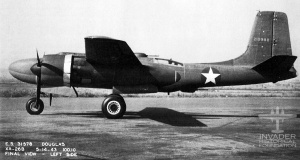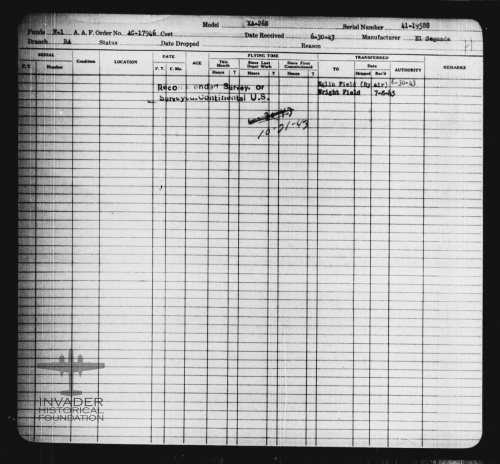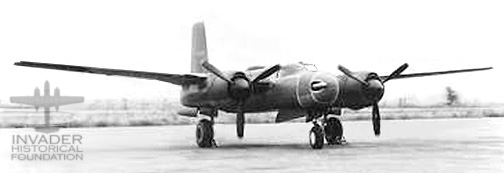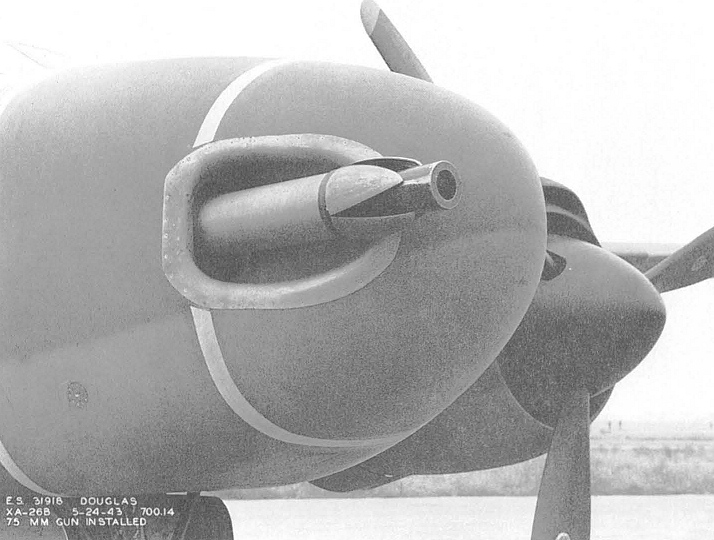41-19588
| XA-26B Invader | |||
|---|---|---|---|
| Builders: Douglas Aircraft Company | |||
| Operators: United States Air Force | |||
| Ordered 1941 | |||
| Number Built: 1 | |||
| First Built: 1942 | |||
| GENERAL CHARACTERISTICS | |||
| Type: Light Attack Bomber | |||
| Dry Weight: - | |||
| Wet Weight: - | |||
| Length: 51' 3" (15.24 m) | |||
| Height: 18' 6" (5.64 m) | |||
| Wingspan: 70' (21.34 m) | |||
| Wing Area: 540 Sq. Feet (50.17 m²) | |||
| Speed: - | |||
| Max Speed: - | |||
| Ceiling: 22,100 feet (6,700 m) | |||
| Powerplant: 2x Pratt & Whitney R-2800-27 | |||
| Horsepower: 2,000 | |||
| Fuel Capacity: - | |||
| Range: - | |||
| Crew: 3 | |||
| Passengers: 1 | |||
| ARMAMENT | |||
| Nose Guns: 1x 75mm Cannon | |||
| Dorsal Turret: None | |||
| Ventral Turret: None | |||
| Payload: 6,000 lbs | |||
See also: List of Invaders by Serial Number
This plane was the third working A-26 Prototype to be fully operational. In July of 1941 Douglas built a full-sized mock-up of the plane with dummy weapons to pitch to the Air Force. That initial display culminated in a contract for two operational prototypes - 41-19504 (The XA-26), and the 41-19505 (XA-26A). Later, the Air Force added a third prototype, the XA-26B (41-19588).
This plane was constructed with a solid nose and tested both with and without the 75mm cannon in the nose. However, it did not have the .50 caliber machine guns installed in the turrets.
There is less information on this particular plane than there is on the XA-26.
This plane served as a secondary prototype for what would become the B model Invader - those equipped with hard noses and heavy machine gun armament. One observable difference between the prototype models and the production models was the "propeller spinner" - the cone-shaped piece in the middle of the propeller blades. The prototype units were equipped with this feature, but none of the production models had them.
Differences between the XA-26B and the other XA prototypes were the addition of a third crew seat. The first two invaders were designed to be flown by a crew of two, but this one was deigned with three - Pilot, Navigator/Radioman, and Gunner.
Despite being constructed and test flown in 1942, the plane wasn't formally accepted by the Air Force until June, 1943.
Operational History
This plane was purpose built as a prototype for testing. It had an extremely short life span of only 4 months in service before it was scrapped.
30 JUN 1943 - Accepted by USAF, flown to Eglin Field, FL.
8 JUL 1943 - Assigned to Wright AFB, OH.
21 OCT 1943 - Approved for reclamation, scrapped.
Accidents
- 10 DEC 1942 - While assigned to the 7th Tactical Training Squadron at March Field, Riverside, CA the plane was involved in some kind of take off accident. The pilot that day was Robert M. Barry. It has a damage listing of 5 on the Air Force report (which many sources take to mean completely destroyed). So, it was either repaired and returned to service, or there was a second plane with the same serial number. The crash report this accident lists the right serial number, but it says the plane is listed as a PQ-8.
- 19 OCT 1943 - The plane crashed while at Eglin Field, Valpariso, FL. The Pilot, Walter J. Wagner, was killed in the crash due to a fire.
Crew
Walter J. Wagner - Pilot
Disposition
This plane was struck from the records at the end of its testing.
Images
Luckily, being a prototype model, there are some images of this plane.
The XA-26B Protoype from the front.

The XA-26B Protoype without the 75mm Cannon.
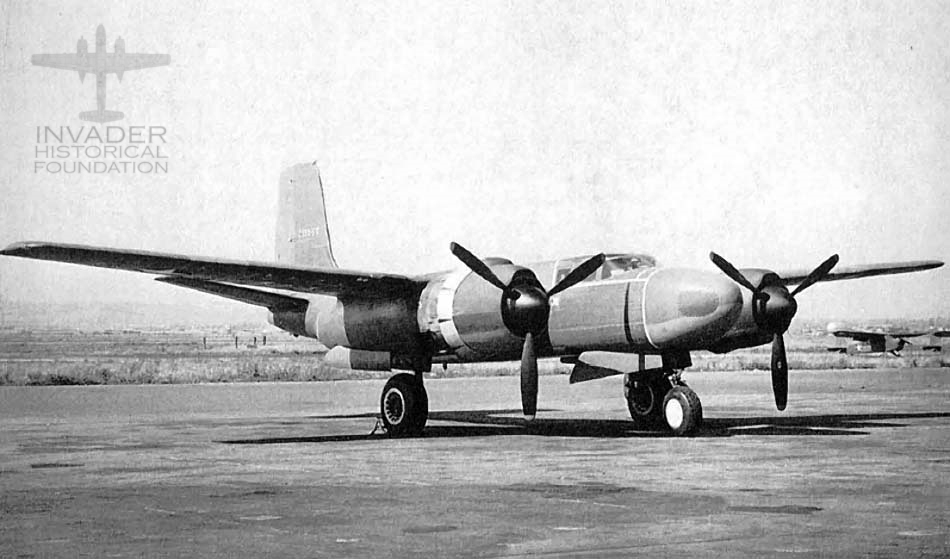
The XA-26B prototype at the Douglas factory.
File:XA-26B real.jpg
